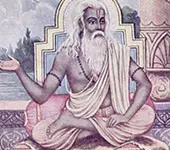
What is dharma and why is it important? This explanation will provide you with a clear understanding of this fundamental concept in Hinduism.
The concept of dharma is deeply rooted in Hindu philosophy and plays a crucial role in guiding individuals towards a fulfilling life. The word 'Dharma' is used in Sanatana Dharma in a variety of contexts. We'll try to comprehend the various contexts in which the word 'dharma' is used.
Dharma as divine qualities
Dharma can be defined as a group of divine qualities that exist in a person or society and influence particular behaviors. This covers both personal and societal behavior. It is the moral behavior of a person, a group of people, or a society that leads to a harmonious and peaceful coexistence.
The concept of dharma is deeply ingrained in many religions and cultures, and is often seen as a means of achieving spiritual growth and enlightenment. dharma encompasses a wide range of values such as honesty, compassion, generosity, humility, and self-discipline. These values are often seen as universal and timeless, providing guidance for individuals to lead a fulfilling life. However, dharma is not static and can evolve over time as society changes.
For example, the definition of what constitutes acceptable behavior towards marginalized groups has shifted significantly in recent years. As such, it is important for individuals to constantly reflect on their own moral compass and adapt accordingly. Ultimately, dharma serves as a guiding force for individuals to lead a life that is not only beneficial for themselves but also for those around them.
Dharma as duty
Dharma also means duties and obligations. For husbands, their dharma is to provide for and protect their family, including their wife, children, and elderly relatives. Similarly, gurus have a responsibility to impart knowledge and wisdom to their shishyas, while the shishyas must surrender themselves completely to their guru and Ishvara.
This understanding of dharma extends beyond individual relationships to encompass broader societal roles as well. For example, rulers are expected to govern with justice and compassion, while citizens must fulfill their duties towards the state by paying taxes and obeying laws. Ultimately, following one's dharma is seen as the key to leading a virtuous life that brings both personal fulfillment and benefits society as a whole.
Dharma as property
The nature or property of an object or an organ is also dharma, more specifically guna-dharma. For example,the dharma fire is to heat and the dharma of the eyes are to see. The ability to flow is a dharma of liquids. , while the ability to conduct electricity is a dharma of metals. In essence, dharma refers to the inherent characteristics and functions of an object or entity.
The Varnashrama Dharma
Two terms, Varna Dharma and Ashrama dharma find prominence in the scriptures of Sanatana Dharma. Varna Dharma is the division of the society based on professions and aptitudes and assigning individuals to professions that suit them. Based on this, the society was broadly divided into four Varnas -
- Intellectuals and advisers (Brahmana)
- Rulers and protectors (Kshatriya)
- Wealth creators (Vaisya)
- Manpower (Sudra)
The life of an individual passes through four phases -
- Studentship (Brahmacharya).
- Householder - wherein he supports a family and contributes to the society (Garhastya).
- Retirement - wherein he gradually hands over the authority and responsibilities to the next generation (Vanaprastha).
- Relinquishment - to dedicate oneself completely towards liberation from the cycle of rebirths (Sanyasa).
It is our duty as human beings to contribute positively towards society and uphold moral values. This can be achieved by engaging in activities that benefit others, such as volunteering or donating to charity. Additionally, it is important to lead an honest and ethical life, which includes being truthful and fair in all our dealings. By fulfilling our duties and upholding dharmik values, we not only benefit society but also cultivate a sense of inner peace and contentment within ourselves. Therefore, it is imperative that we strive towards fulfilling our dharma and contributing positively towards society.
What are the core beliefs of Sanatana Dharma?
The core beliefs of Sanatana Dharma are: 1. The belief in a single, eternal, and all-pervading reality, which is often referred to as Brahman. 2. The belief in the soul (atman), which is the individual expression of Brahman. 3. The belief in reincarnation, the process by which the soul is reborn into a new body after death. 4. The belief in karma, the law of cause and effect, which governs the cycle of reincarnation. 5. The goal of moksha, liberation from the cycle of reincarnation and union with Brahman.
What are the practices of Sanatana Dharma?
The practices of Sanatana Dharma vary widely, but some common practices include: 1. Puja, the worship of a deity or deities. 2. Meditation, the practice of focusing the mind on a single point. 3. Yoga, a system of physical and mental exercises. 4. Karma yoga, the practice of selfless service. 5. Jnana yoga, the path of knowledge.
Quiz
Which text describes about gravitational force ?Recommended for you
People who bring your attention to your body are your enemies
 Click here to know more..
Click here to know more..
Chandamama - November - 1982
 Click here to know more..
Click here to know more..
Shiva Lahari Stotram

siddhibuddhipatim vande shreeganaadheeshvaram mudaa. tasya yo vandanam kuryaat sa dheenaam yogaminvati. vande kaasheepatim kaashee jaataa yatkri'payaa....
Click here to know more..
English Topics
Rare Topics
Click on any topic to open
- 237 The Practice of Bhojana Sadhana
- 236 Words of Wisdom - 2
- 235 Defining Goodness - Sanatana Dharma's Perspective
- 234 Vibhishana in Ramayana - A Tale of Morality, Loyalty, and Redemption
- 233 God will not let you break
- 232 A Glimpse into the 64 Arts
- 231 Chembai Vaidyanatha Bhagavatar - A Carnatic Maestro's Musical Odyssey
- 230 Understanding Adhyāsa: A Closer Look at False Attribution
- 229 Is Family's Permission Necessary For Becoming Sanyasi ?
- 228 Faith In Upasana
Please wait while the audio list loads..
30
Ganapathy
Shiva
Hanuman
Devi
Vishnu Sahasranama
Mahabharatam
Practical Wisdom
Yoga Vasishta
Vedas
Rituals
Rare Topics
Devi Mahatmyam
Glory of Venkatesha
Shani Mahatmya
Story of Sri Yantra
Rudram Explained
Atharva Sheersha
Sri Suktam
Kathopanishad
Ramayana
Mystique
Mantra Shastra
Bharat Matha
Bhagavatam
Astrology
Temples
Spiritual books
Purana Stories
Festivals
Sages and Saints
